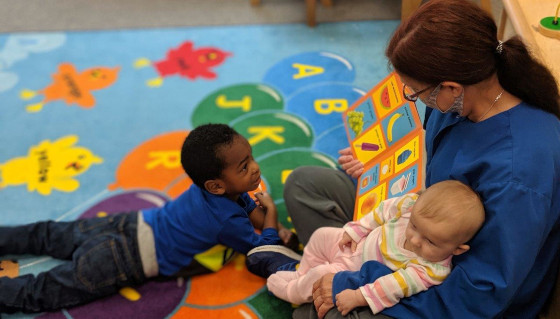Infant and Toddler Teachers Master Skills with Specialized Coaching
by Shawn Deiter
November 7, 2020

Intentional Interactions
When Ms. Vicki picked out a book to read to a toddler in her classroom, she purposely chose one filled with colorful images of food and large print to help the young boy practice learning colors and add new words to his emerging vocabulary. Her lesson plan for the week centered on the theme of colors and today’s color was blue. The boy spied the blue cupcake on the page. He was instantly curious and captivated. He pointed, asked “blue?”, and then lay down on his belly to listen to his teacher.
“Teachers need to have a goal in mind before interacting with a child and not just randomly approach the child,” Zachary Cohen, M.Ed. explained. “This is called an intentional interaction. If I’m focusing on this child’s social-emotional development, I need to see if he can actually share or take turns. I have to have a plan to support his development to get the child from point A to point B.”
Zachary and his wife, Sherki Cohen, M.S., are a professional development and educational consulting team. Through their company, The Heuristic Process Factory, they have been mentoring and coaching LVCC’s teachers in the new Infant-Toddler Contracted Slots (ITCS) program. The teachers are learning methods to more effectively respond to the children’s needs and become better educators. Intentional Interactions Infant/Toddler Training is among the many specialized professional development sessions that the teachers have completed.
Lesson Plans
In early learning, teachers assess a young child’s abilities by observation. Lesson plans help teachers set goals for a child to reach their developmental milestones. The consultants have been working together with the ITCS teachers to incorporate their observations of the children into building stronger lesson plans.
“There are two types of goals—group goals as a class and individual goals,” Sherki said. “You might have a child who has a challenge in a particular area and needs more support, then you have another child who has moved past a milestone and needs to be challenged. We capture all of that—individual needs, as well as group learning goals—into this lesson plan.”
ITCS classrooms intentionally enroll children of mixed ages. As Ms. Vicki read to the toddler, she held an infant on her lap, engaging both children in a shared reading activity. Immersing young children in language – reading, singing, talking – exposes them to more words and increases their cognitive development. This small planned activity, shared by an infant and a toddler, benefited them on different levels and at different stages of their development.
Early childhood education teachers enjoy adding hands-on art projects into their lesson plans. Wall-to-wall paintings and three-dimensional creations hang throughout the LVCC classrooms. Teachers often turn to the Internet for inspiration. Pinterest is one of the most popular sites. The consultants, however, are training the teachers to use observations, assessments, and their own creativity first.
“If they find a good idea somewhere else, modify it to fit the needs of the program.” Zachary said. “Go to the PA Early Learning Standards. Make sure the idea is developmentally appropriate based on expectations for a child in that particular age group.”
Family Engagement
Family engagement is a key component to a child’s developmental success. Prior to COVID, LVCC could easily invite families into the classroom for literacy events or family crafts. The consultants are helping the ITCS teachers with creative ideas on how to engage families virtually to include in lesson plans.
"Mom, dad, and grandmom can still read a book and post the video on YouTube that can be played in the classroom. We’re just trying to adapt with the times,” Sherki said. “The ultimate goal is to improve the quality of all the sites.”